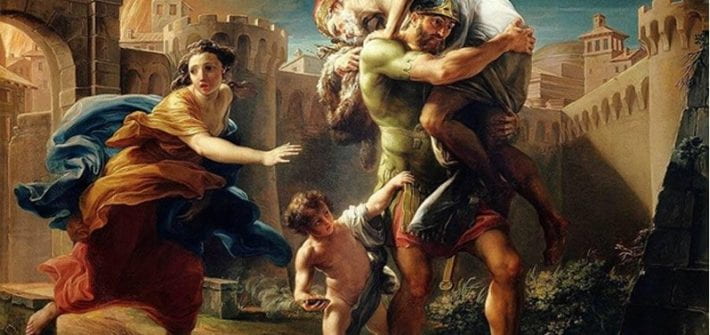Revisiting Lofty Arches: the Transmigration of Souls in Aeneid 6
By Erin Schott
In the beginning, the inner spirit
nourishes the sky, lands, and liquid fields,
the shining globe of the moon and Titan’s stars…

Revisiting Lofty Arches: the Transmigration of Souls in Aeneid 6
By Erin Schott
In the beginning, the inner spirit
nourishes the sky, lands, and liquid fields,
the shining globe of the moon and Titan’s stars…

Demonstering: A Postcolonial Reading of Aeneid 3, & The Practice of Humanizing Monsters in Ancient Literature By Anna Coopey Introduction Virgil was a witness to colonization and imperialism. He grew up in Mantua, and experienced, as a young man, the results of the civil wars where Augustus’s allies carved up the land for themselves. […]

The Hero’s Journey
By Lily Nesvold
As a modern, musical interpretation of Virgil’s Aeneid, “The Hero’s Journey” is an instrumental track created using GarageBand, a digital audio workstation, combined with Renderforest, a music visualizer service. I created this piece as my final project for CLST-143, “Great Books of Greece and Rome,” taught by Professor Alison Traweek…

Virgil, Georgics 2.458-542
Translated by Sara Chopra
In this final passage of Book 2 of his Georgics, Virgil presents his reader with an ode to the farmer, extolling the virtues of country living. However, as much as these closing lines celebrate the joys of an agrarian lifestyle, they equally express the poet’s distaste for the corruption that has taken hold of his city, Rome…

Minute-Long Myths – CLST 100 Crash Course
By Alicia Lopez
Your time in Classical Mythology may be coming to a close, but preparing for the final exam doesn’t have to feel like a Herculean labor. Welcome to your CLST 100 crash course, featuring memorable minute-long renditions of each myth on the syllabus…

“Canto Audentium” (I Sing of the Daring)
By Lily Nesvold
After reading Dante’s Inferno in high school, I was inspired to write a descriptive piece that mimics his style of writing but presents a modern twist and incorporates the Latin language. Set forty years in the future, my rendition of the classic depicts a sin—hubris—tacked onto the end of “Incontinence,” the initial subsections of Hell, but occurring before the walls of the city of Dis…

Aeneid 4.173-188
By Ryan Cooper
Few would dispute that misinformation and the media are in a spotlight of attention right now, and I’ve often thought about Virgil’s depiction of Fama in Book IV of Aeneid, and just how closely related his image is to that of the rumors and misinformation of the current world…

The Hive
By Cate Simons
During quarantine, I’ve spent much of my time outdoors. Outside, surrounded by nature, I’m able to slow down and separate myself from some of the anxiety I’ve lately felt about the general state of the world. In the last few months, this passage from Vergil’s Georgics has been very much on my mind, and I’m especially drawn to Vergil’s efforts to portray bees in human terms…